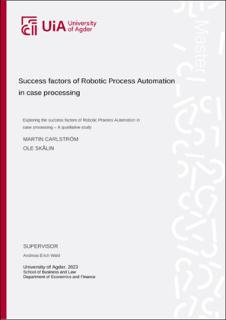| dc.description.abstract | Robotic Process Automation (RPA) is an alternative to automation and process management practices. Due to its applicability, RPA can function within current data systems and automate tasks by emulating human workers. RPA has emerged in the organizational environment as a measure to reduce costs and improve processes efficiently. Our motivation for this thesis developed through first-hand experiences with RPA. The literature identifies RPA to be suitable in high volume and repetitive processes, making case processing a top candidate for implementation.
Prior studies point out the need to identify and develop frameworks for success factors for RPA.This master thesis identifies and develops such a framework to answer the research question: “What are the success factors for RPA in case processing?”. We perform a grounded theory approach, conducting 10 semi-structured interviews with informants close to the phenomenon. We find 10 success factors and place them in three groups: Organization and strategy, Development structures, and Humans and stakeholders. Based on this, we critically discuss the various factors and compare these to prior literature. Lastly, we highlight the need for further research and the practical and theoretical implications. | |
